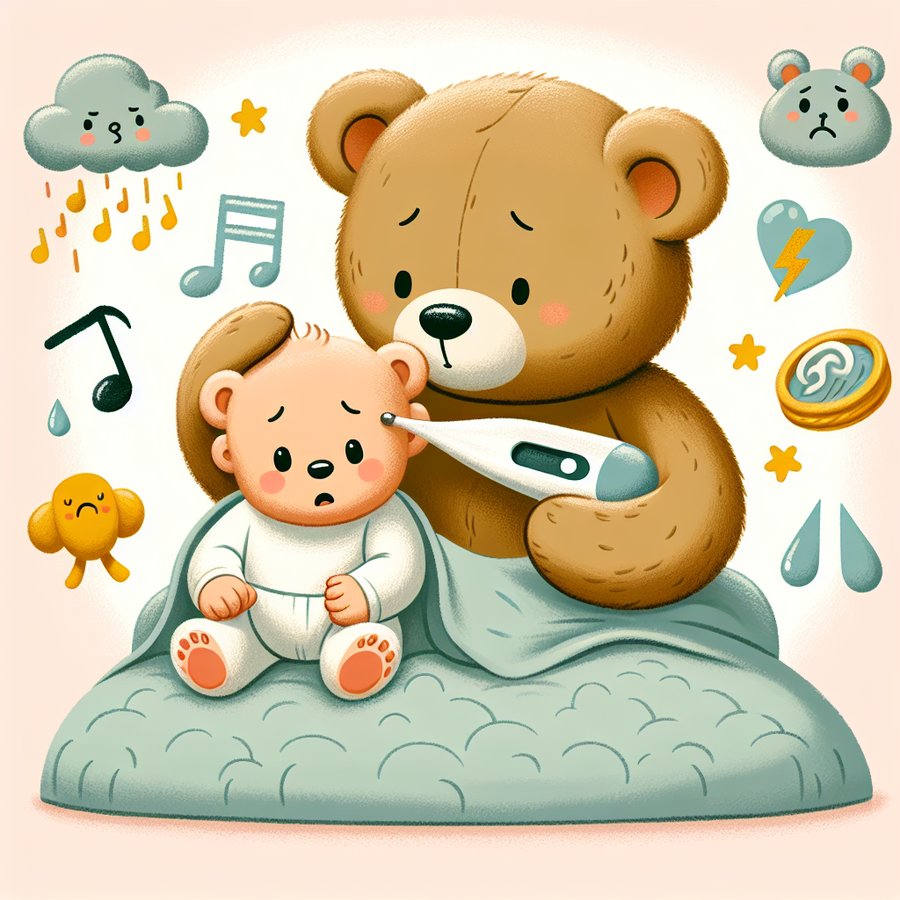Figuring out newborn ear infection symptoms can be as tricky as solving a mystery. As a new parent, you’re on a constant quest to ensure your baby’s health and happiness, but sometimes the clues are not so obvious. I remember the first time my little one had an ear infection; I was clueless and worried, wishing for a guide to help me through. That’s why I’m here to share what I’ve learned, along with expert advice, to help you navigate these choppy waters.
What Are Newborn Ear Infection Symptoms?
Newborn ear infection symptoms can sometimes fly under the radar. Generally, these include fussiness, trouble sleeping, fever, and pulling at the ears. But remember, newborns can’t tell us what hurts, so we have to be their detectives. A common sign I noticed was how my baby would suddenly start crying during feedings; it was their way of saying, ‘Hey, something’s not right here.’
Babies might also show decreased appetite or difficulty hearing. It’s crucial to observe these subtle changes in their behavior or routine. Consulting a pediatrician is always the best course of action if you suspect an ear infection. They can do a thorough examination and even use a special instrument to look deep into the baby’s ear canal.
Why Do Newborns Get Ear Infections?
Understanding the ‘why’ behind newborn ear infections can help in preventing them. The primary reason is the Eustachian tubes in newborns are shorter and more horizontal than in older children or adults. This makes it easier for germs from the throat to travel up and get trapped in the middle ear, leading to infections. Plus, their immune systems are still developing, making it harder to fight off these germs.
Another factor can be exposure to cold viruses or secondhand smoke, which can increase the risk of ear infections. My pediatrician also mentioned that bottle-fed babies might have a slightly higher risk than breastfed ones, possibly due to the position they’re in while feeding. This was a game-changer for me, and I started being more mindful of my baby’s feeding position, even incorporating more breastfeeding sessions where possible.
How Can You Comfort a Baby with an Ear Infection?
Comforting a baby with an ear infection is about being patient and trying different soothing techniques. Warm compresses gently placed on the ear can provide some relief. I found that holding my baby upright, especially during feedings, helped ease their discomfort. It’s also important to keep them hydrated and, if advised by your pediatrician, to give the appropriate dose of pain relievers designed for infants.
Creating a calm environment can also work wonders. Softly singing or playing quiet lullabies can comfort your baby, making them feel secure and loved, even amidst discomfort. Remember, your presence is the most soothing remedy for your baby.
When Should You Seek Medical Advice for Newborn Ear Infection Symptoms?
Knowing when to seek medical advice for newborn ear infection symptoms is crucial. If your baby shows signs of severe pain, fever above 100.4°F, or any unusual discharge from the ear, it’s time to call the pediatrician. Also, if your baby is less than 6 months old and shows any signs of an ear infection, don’t wait to seek advice. Early treatment can prevent further complications, such as hearing problems or more severe infections.
During my first experience, I learned that prompt action and following the pediatrician’s advice made a significant difference in my baby’s recovery. They may prescribe antibiotics if the infection is bacterial, or suggest other treatments if it’s viral. Either way, professional guidance is your best bet.
Preventing Newborn Ear Infections: Is It Possible?
While it’s not always possible to prevent newborn ear infections entirely, there are steps you can take to reduce the risk. Breastfeeding for the first six months, if possible, can offer protection against ear infections. Avoiding exposure to tobacco smoke and ensuring your baby is up to date with vaccinations, including the flu shot and pneumococcal vaccine, can also make a difference.
Maintaining good hygiene, such as regular hand washing and cleaning your baby’s toys and pacifiers, can help prevent the spread of germs. And, as mentioned before, being mindful of your baby’s feeding position can also help. Remember, every little effort can contribute to a healthier, happier baby.
For more detailed guidance on related topics, feel free to explore our articles on creating a non-toxic nursery, the safe sleep practices to reduce the risk of SIDS, and choosing the safest baby car seats for newborns.













